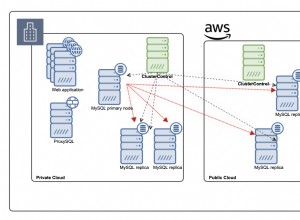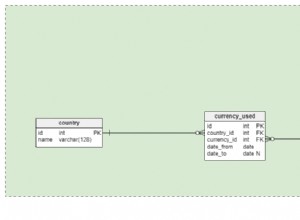Je supprimerais ce didacticiel, la sécurité de la connexion ne doit pas être considérée à la légère, vous ne devriez pas avoir de mots de passe en clair dans la base de données, ils doivent être hachés avec un sel et les deux doivent changer lors d'une connexion réussie.
Voici un script de connexion sécurisé :
Il utilise PDO pour la connexion à la base de données, le formulaire de connexion réel utilise des clés aléatoires pour la connexion, par exemple. pas nom d'utilisateur/mot de passe. Les mots de passe sont hachés avec sha512 x 25k fois et avec un sel de clé de 16 octets, une protection contre la force brute. J'espère que cela aide.
<?php
session_start();
/**
* Table
CREATE TABLE IF NOT EXISTS `users` (
`id` int(11) NOT NULL AUTO_INCREMENT,
`username` varchar(45) DEFAULT NULL,
`pass_hash` varchar(255) DEFAULT NULL,
`pass_salt` varchar(255) DEFAULT NULL,
PRIMARY KEY (`id`)
) ENGINE=InnoDB DEFAULT CHARSET=latin1 AUTO_INCREMENT=0 ;
*/
//DB Stuff
define('DBHOST','localhost');
define('DBNAME','yourdb');
define('DBUSER','root');
define('DBPASS','');
//End Config:---
//Open a PDO Database connection
try {
$db = new PDO("mysql:host=".DBHOST.";dbname=".DBNAME, DBUSER, DBPASS);
$db->setAttribute(PDO::ATTR_ERRMODE, PDO::ERRMODE_EXCEPTION);
$db->setAttribute(PDO::ATTR_EMULATE_PREPARES, false);
}catch (Exception $e){
die('Cannot connect to mySQL server.');
}
class Login{
public $db;
public $user;
public $pass;
public $error;
// sha512
public $algo = '$6';
// Cost parameter, 25k iterations
public $cost = '$rounds=25000$';
function __construct(PDO $db){
$this->db = $db;
$this->global_salt = sha1($_SERVER['HTTP_HOST']);
}
/**
* Return a random seed for the mt_rand function
*/
function make_seed(){
list($usec, $sec) = explode(' ', microtime());
return (float) $sec + ((float) $usec * 100000);
}
/**
* Return a random unique salt for new created hash/crypt function salts
*/
function unique_salt(){
$salt = null;
mt_srand($this->make_seed());
for($i=0;$i < mt_rand(1,10);$i++){
$salt = sha1($this->global_salt.$salt.mt_rand().uniqid().microtime(true));
}
return substr($salt,0,16);
}
/**
* Hash a given password and store parts in:
* $this->salt = a unique 16 byte salt
* $this->hash = The full crypted hash sting including algo/cost/salt/crytedpassword
* $this->full_salt = Just algo/cost/salt section, the first 33 bytes
* $this->hashed_password = Just crytedpassword section, proceeding bytes after first 33 bytes
*
*/
function hash($password){
$this->salt = $this->unique_salt();
$this->full_hash = crypt($password, $this->algo.$this->cost.$this->salt);
$this->full_salt = substr($this->full_hash, 0, 33);
$this->hashed_password = substr($this->full_hash, 33);
return $this->full_hash;
}
/**
* Method to validate the given crypto hash against the given password
*/
function check_password($hash, $salt, $password){
$hash = ($this->algo.$this->cost.$salt.'$'.$hash);
if($hash == crypt($password, substr($hash, 0, 33))){
//Regenerate new hash and salt for given password
$this->update_keys();
$this->status = true;
$_SESSION['logged_in']=true;
return true;
}else{
$this->status = false;
return false;
}
}
/**
* Set error
*/
function set_error($type,$value){
$this->error[$type]=$value;
}
/**
* Output error
*/
function error($type){
echo (isset($this->error[$type]))?$this->error[$type]:null;
}
/**
* Logout and regenirate session and redirect to index
*/
static function logout(){
unset($_SESSION['logged_in']);
session_regenerate_id(true);
exit(header('Location: ./index.php'));
}
function anti_brute($intval){
if(!isset($_SESSION['access_time'])){
$_SESSION['access_time']=time();
}else{
$t = time()-$_SESSION['access_time'];
if($t <= $intval){
$this->set_error('global','Time violation');
$_SESSION['access_time']=time();
return true;
}
$_SESSION['access_time']=time();
return false;
}
}
function process_login(){
if($_SERVER['REQUEST_METHOD']=='POST'){
$this->user = (isset($_SESSION['userParam']) && isset($_POST[$_SESSION['userParam']]))?$_POST[$_SESSION['userParam']]:null;
$this->pass = (isset($_SESSION['passParam']) && isset($_POST[$_SESSION['passParam']]))?$_POST[$_SESSION['passParam']]:null;
$this->create = (isset($_SESSION['createParam']) && isset($_POST[$_SESSION['createParam']]))?$_POST[$_SESSION['createParam']]:null;
$cont = true;
if($this->user == null || strlen($this->user) <= 2){$this->set_error('user','Please enter a username!'); $cont=false;}
if($this->pass == null || strlen($this->pass) <= 2){$this->set_error('pass','Please enter a password!'); $cont=false;}
if($cont==true){
//Alls good continue
if($this->create != null && $this->create=='1'){
//Check user for new account
if($this->check_user()==true){$this->set_error('user','Username already taken.');return;}
//Create account
$this->create_account();
}else{
//Stop really fast request 2 seconds
if($this->anti_brute(2)==false){
//Attempt to login
$this->check_login();
}
}
}else{
//Error with form
$this->set_error('global','Please fill in login form!');
}
}
}
function check_user(){
$sql = 'SELECT 1 FROM users WHERE username=:username';
$statement = $this->db->prepare($sql);
$statement->bindParam(':username', $this->user, PDO::PARAM_STR);
$statement->execute();
$result = $statement->fetch(PDO::FETCH_ASSOC);
if(!empty($result)){return true;}else{return false;}
}
function check_login(){
$sql = 'SELECT pass_hash, pass_salt FROM users WHERE username=:username';
$statement = $this->db->prepare($sql);
$statement->bindParam(':username', $this->user, PDO::PARAM_STR);
$statement->execute();
$result = $statement->fetch(PDO::FETCH_ASSOC);
$this->check_password($result['pass_hash'], $result['pass_salt'], $this->pass);
}
function create_account(){
//Create new account
$this->hash($this->pass);
$sql = 'INSERT into users (username, pass_hash, pass_salt) VALUES (:username, :pass_hash, :pass_salt)';
$statement = $this->db->prepare($sql);
$statement->bindParam(':username', $this->user, PDO::PARAM_STR);
$statement->bindParam(':pass_hash', $this->hashed_password, PDO::PARAM_STR);
$statement->bindParam(':pass_salt', $this->salt, PDO::PARAM_STR);
$statement->execute();
$this->status = true;
$_SESSION['logged_in']=true;
}
function update_keys(){
//Update account password hash & salt
$this->hash($this->pass);
$sql = 'UPDATE users SET pass_hash=:pass_hash, pass_salt=:pass_salt WHERE username=:username';
$statement = $this->db->prepare($sql);
$statement->bindParam(':username', $this->user, PDO::PARAM_STR);
$statement->bindParam(':pass_hash', $this->hashed_password, PDO::PARAM_STR);
$statement->bindParam(':pass_salt', $this->salt, PDO::PARAM_STR);
$statement->execute();
$this->status = true;
$_SESSION['logged_in']=true;
}
}//END Login class
//Logout handler
if(isset($_GET['logout'])){ Login::logout(); }
$login = new Login($db);
//Login handler
$login->process_login();
//Debug
echo '<pre>';
print_r($login);
echo '</pre>';
//Check login status
if(isset($_SESSION['logged_in']) && $_SESSION['logged_in']==true){
//Logged in
echo '<a href="?logout">Logout</a>';
}else{
//Not Logged In
//Show login form & create uniqie parrams for user/pass/create post keys
$_SESSION['userParam'] = sha1(uniqid().microtime(true));
$_SESSION['passParam'] = sha1(uniqid().microtime(true));
$_SESSION['createParam'] = sha1(uniqid().microtime(true));
?>
<!DOCTYPE html PUBLIC "-//W3C//DTD XHTML 1.0 Transitional//EN" "https://www.w3.org/TR/xhtml1/DTD/xhtml1-transitional.dtd">
<html xmlns="https://www.w3.org/1999/xhtml">
<head>
<meta http-equiv="Content-Type" content="text/html; charset=utf-8" />
<title>Secure Login</title>
</head>
<body>
<h1>Secure Login Example</h1>
<h3>Please login:</h3>
<?php $login->error('global'); ?>
<form method="POST" action="">
<label for="user">Username : </label>
<input type="text" name="<?=$_SESSION['userParam'];?>" size="29"> <?php $login->error('user'); ?>
<br />
<label for="pass">Password : </label>
<input type="text" name="<?=$_SESSION['passParam'];?>" size="29"> <?php $login->error('pass'); ?>
<br />
<input type="submit" value="Login"> and create my account:<input type="checkbox" name="<?=$_SESSION['createParam'];?>" value="1">
</form>
</body>
</html>
<?php } ?>




